Hoopsfix 1 on 1: Marc Steutel
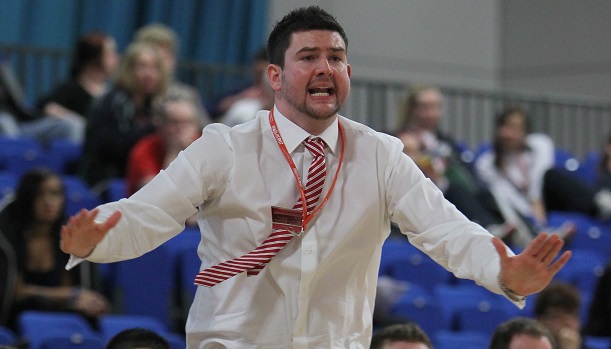
We got a chance to sit down with two time Coach of the Year winner and one of the UK’s up and coming coaching talents, Marc Steutel, of Team Northumbria, who has had a busy summer assisting with the Great Britain Under-20s, and is now in full preparation mode for the coming season as he looks to top Northumbria’s third place finish in Division 1 last year. We spoke about everything from how he first got into the game, his coaching philosophy, Northumbria, and GB U20s to married life! Check it out (questions in bold, answers in regular):
Can you start off by just introducing yourself to those who might not know you – your current roles and background with a brief run down of your playing/coaching career to date?
I started playing basketball at Ellesmere Port Panthers under Coach Jimmy McGinn. After a couple of years there I went to East Durham Academy and played for Bob Martin, Brian Calder, Craig Lynch & Greg Modezelewski. I feel like I was extremely lucky to be coached by all of these at such an early age and like to think that I still use something from each one of them in my coaching today.
Following East Durham I spent a year playing at a high school in Ohio in the US, then returned to East Durham Academy and Sunderland University to gain my degree. After my second year of university I transferred to Southampton Solent University where I played for Solent Stars in EBL 1. I returned to the North East to complete my studies and play for Team Northumbria.
I settled in Newcastle and spent the last of my playing days competing for Team Northumbria whilst studying for my PGCE. Throughout this journey I was fortunate enough to represent England at Under 18s and English Universities level and I am still incredibly proud of those memories.
After year one of my PGCE I was offered the opportunity to make the step up to coaching senior men’s and Head Coach Team Northumbria in EBL 2. I had been coaching junior national league for three years with the Newcastle Eagles School of Excellence till that point and had also assisted in the BBL for a season with the Eagles first team. Finally, I have been Head Coach at Tyne Met College for 5 years, which is the official performance partner college of the Newcastle Eagles.
At what point did you decide you want to become a coach, what made you decide?
I’m going to be brutally open and honest here! Coaching was always something I have done on the side whilst trying to pursue a career as a player. I have always enjoyed it, even from a young age when I would return home in the summers from East Durham and coach on Jimmy McGinns basketball camps, but I was always more focused on trying to progress as a player.
When I graduated University I applied for a coaching job with the Eagles Community Foundation (ECF)in which I was successful. The timing couldn’t have been better as I had been out of university for 2 weeks. The post was organising and delivering basketball sessions, which formed part of a bigger healthy living project targeting primary schools in the east end of Newcastle. It was an ideal job for me as I was still able to focus on playing at the time in the evenings and early mornings.
However, as I spent more time coaching I was persuaded to take on a national league time by ECF general manager Sam Blake. I started with the Under 16s and had the most positive experience that it was always going to be coaching from that point onwards. I haven’t regretted stopping playing at a (relatively!) early age to pursue coaching, I have loved every second of it!
And then how did you go about becoming a coach? What steps did you take and what has allowed you to get the point you are at today, recognised as one of the top up and coming British coaching talents?
I was quite fortunate that I had an excellent support network in the ECF and Newcastle Eagles itself when I started. I was surrounded by high level experienced coaches that I was able to turn to on a daily basis. I spent a lot of time picking Fab Flournoy’s brains and leaned on him quite a bit when I first started (I still do to this day!).
I also knew that I wanted to see as many different coaches as I possibly could. Simon Fisher invited me along as a volunteer assistant with the Under 16s National Team (coincidentally was the 93s!) which was a great learning experience for me. I really feel this experience helped accelerate my development and gave me a desire to improve rapidly.
Since then, I have always tried to be a student of the game as much as possible. Whether that’s in the form of observing other sessions, attending clinics, watching coaching resources online or simply speaking with other coaches. They have all been very useful ways of developing myself.
However, I must say that I stick to my philosophy religiously and I do think that has helped me to this point. I feel that some coaches are always looking for the latest development and a magical quick fix answer that is ground breaking. Whilst I encourage coaches to study as much as possible, you must decipher what is relevant to you and what you believe in. Sometimes this can be the basics and the most obvious of things.
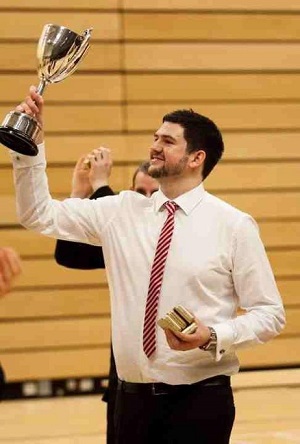
Funding, put simply. There are development opportunities out there, but most require a lot of funding. I have incurred a lot of cost over the years travelling to watch as many coaches as I can. On the same issue I have colleagues who coach within the Newcastle United Football Academy. It amazes me the level of support they receive when coaching teams from Under 9s all the way through to seniors. They have three paid coaches for every age group, weekly mentor sessions with a senior coach and excellent development activities in house at the academy. I know football is the biggest participation sport in the country but the systems they have in place are excellent, and the national football teams are terrible currently! It’s down to the finances they have available, It’s so frustrating! More funding for our developing coaches would mean better development opportunities.
I do also think that coaches are really set on being Head Coaches very early on over here. You can gain so much from being an assistant and being mentored by an experienced senior coach. I have been lucky to be around some excellent coaches early on certainly benefited from this.
You’ve just finished your first campaign with the Great Britain Under-20s, where you achieved unparalleled success – how do you reflect on the experience and why do you think it was this year’s group were able to succeed where others have failed?
Reflecting upon the experience, it’s quite difficult to say anything other than it’s one of the proudest moments in my career and the memories will stay with me a lifetime. Any time you represent your country at any level is an honour and a privilege and this was no different.
It’s difficult to comment or compare this year to previous campaigns, but I can say why I thought we had success this summer. The first factor I would point out is leadership. I really thought the way that Head Coach (Doug) Leichner led the programme was incredible. He was driven, focused and engaging with every squad & staff member that cultured a sense of togetherness.
Behind his leadership we were all pulling in the same direction and felt like we were on a journey that we all believed in wholeheartedly. A team identity and style was created that everyone fully bought into because it was successful. The players commitment and dedication was remarkable.
(Assistant) James Vear was also a big contributor, demonstrating excellent tactical awareness; he really is one of the best British coaches we have and I have no doubt he’ll be successful in Denmark (Editor’s note – he has signed as head coach of Aalborg Vikings for this season).
I like to think of myself as patriotic and it seemed like there was really a sense of pride in the GB shirt that you would hope to see at international level. I don’t want to say that the players sacrificed (I am fully appreciative of the time they give up in the summer!) as it is an honour to play for your country, but they most certainly put their own personal agendas to the side in pursuit of team success.
I think the last factor was toughness. The group harboured a sense of toughness that carried us through a lot of situations. As you can imagine, it wasn’t always smooth going in every game, and players and staff were able to be quite frank and direct with each other. A group toughness enabled us to deal with these situations effectively and learn from them each time. This toughness really did lead to a never say die attitude!
Finally, I would really like to take a second to mention Team Manager Mark Lloyd here. All the staff and squad contributed to this success as mentioned, but Mark has been involved with national teams for years and really deserved this more than most. Quite often a team manager’s work doesn’t get too many plaudits, but the job that Mark did was outstanding. Combing all of his management and coaching experience he really enabled all staff and squad to work at the highest level and is a true asset to GB basketball!
Is working with GB/England national teams something you would like to continue to do for the foreseeable future? Coaching the GB Senior Men a long term future goal?
Yes is the short answer here! I love being a part of the national teams set up and want to be a part of them for as long as possible.
I would also love to be part of the GB Senior men’s set up one day. I am still very young in terms of coaching and still have a lot of developing to do, but I am a big believer in setting big goals and aiming for them. Some people do not want to openly say that are hoping for a position, but I am happy too. I think the fear of failure can be a powerful tool when motivating people, particularly when trying to achieve a goal. Being involved with the GB Seniors one day would be the biggest honour in my career and a dream come true.
Can you talk a little bit about what you’ve got going on up at Northumbria? What’s the goals for you and the programme up there? How does it all work with the Eagles?
I love our programme at Newcastle Eagles Team Northumbria. We are one whole club running from the BBL through to EBL senior men & women and all the way down to our junior national league and central venue clubs. We have an excellent system that has been developed through the outstanding work of Paul & Sam Blake and Deirdre Hayes over the previous 11 years. We literally went from no one playing basketball to having a lot of opportunities for young people to play basketball.
Like any other programme, we are always looking for ways to improve our programme but we are really proud of our growth over the previous few years. We now have coaches and players involved with National Teams, and players moving onto higher levels from our junior programme.
Specially with Northumbria, I completely love my role. It’s literally the best of both worlds in terms of getting the balance right between development and performance. As we are a University based programme we primarily look for committed student/athletes who want to develop individually and help the team progress in EBL and BUCS competitions.
I still very much get to focus on player development as a lot of the players are 18 when they attend and very much have a lot of improving still to do. Obviously, because of the level we play at, getting the team ready to play and perform is also crucial so I really do love my role and wholeheartedly believe in what we do. In terms of goals for the programme they are relatively simple;
-develop players to the best of their potential
-compete at the highest level possible on all fronts for the university
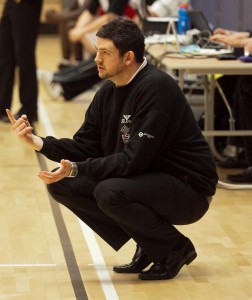
We really don’t experience any friction with the Eagles and Northumbria. Firstly, I am employed by the ECF to deliver the basketball programme at Northumbria. I have already eluded to the fact that I lean on Fab heavily for all things basketball and he does take a great interest in our programme, often being at our sessions and games to observe. I’m sure you can imagine how busy he is, yet he still finds the time to breakdown game film with me whenever asked.
I communicate with Eagles Managing director Paul Blake on a daily basis and as a former graduate of Northumbria university he is extremely invested in how we are getting on. The fact that our training sessions cross over most nights also allows all of the players to interact and any players who are with Northumbria and training well can also stay and train with the Eagles.
We have also had many players who have gained the most out of our system and played with both teams to maximise their development, such as Sam Attah, Jamie Glen, Ross Wilson, Lamar Morrison and currently Jack Wilson & Eddie Matthew.
How is the team coming together for next season? Are you expected to better on last year’s third place finish?
I am really, really excited about this next season. We returned a lot of players from year one to year two which really helped with our first season in EBL 1. However, 8 players from last year’s squad have graduated and we are bringing in a lot of exciting recruits with a core domestic base.
The one area in which we are still really hoping to add some depth is a big! The majority of domestic bigs play in the US or have already graduated. I am still very much looking for some extra strength in this position for next seasons (Editor’s note: Northumbria have a support package available for any big man looking for a team/university next season, see byline at end of interview).
As a whole, I am very happy with the way that recruitment has went so far. I think it’s going to be a challenge, but one that I am certainly relishing. In some ways it’s like starting from scratch with a group so will try to get them up to speed as quick as possible. This is an ongoing challenge with the cyclical nature of university sports.
In terms of matching last year’s finish in the league, of course it would be good, but we will only set goals that we can control. Things such as points conceded per game and the rebound battle we will try to win. I believe if we expect to win these things, then team success is a by product that we would be thrilled to experience.
Last year you were on the wrong end of what must’ve been one of the most controversial endings in EBL Division 1 history – losing to Worthing in the semi-final on an interference call at the buzzer. Having had time to reflect and watch the tape, do you think it was the right call? Is it still something that tortures you or have you moved on?
Great question! Firstly, for anyone to lose in that manner is difficult to take in any sport. Just to get some closure on the event as a whole, we will talk about it with the whole group once when we start preseason, then put it to rest. Not specially the final call, but the emotions surrounding the loss which will help us with our motivation for this season.
I still maintain the same stance on this matter that I did at the time, which was that the game as a whole could have been better managed and the way in which the final call was administered could have been more sympathetic. In terms of the final call, the officials got the decision correct in my opinion. From the angle I was watching the incident live it looked as though as it was a Worthing player that interfered with the basket, however when seeing it from other angles and according to FIBA rules I do believe it was correct.
I do think that this incident and the game as a whole raised some interesting issues surrounding refereeing. I spoke with length to the referees assessors the following day. Firstly, I apologised for overall conduct as emotions were running extremely high after the decision. More importantly I would like to see at least one senior official involved at national finals. I am all for development, but I would prefer to see one senior official in every crew so there is some experience when situations like these arise.
However, when reflecting, you can’t play as poorly as we did offensively and expect to win. That is my final thought on that day unfortunately.
Players of yours I have spoken to cannot say enough about the preparation you put into a game. Can you talk a little about what you do at a minimum before your games to prepare the team? How many other teams at EBL D1 level do you think put in this level of detail?
If we lose a game, I always want to ensure its not because another team hurt us without us knowing what to expect from them. From a personal standpoint also, I hate the feeling of going into a game ‘blind’. When we have a specific game plan and all players are working towards it, it really cultures a sense of togetherness.
We start our preparation with trying to get tape of our next few opponents a few weeks prior to playing them. There are a network of coaches and programmes that are happy to exchange tape. I really think we should adopt a system similar to that of US colleges with tape sharing. Most leagues have an online facility where you upload the tape a few hours after the game has finished. This would really put emphasis and pressure on the quality of coaching and the preparation they do prior to games.
Anyway back to point, when I receive the tape I like to watch it a couple of times individually. I have a template that I use which as a basic overview covers things like offensive & defensive tendencies, specific sets or plays, endline & sideline out of bounds, player tendencies and any extra notes. I won’t get into the full details, but this helps me plan for little tweaks game – game. For example, how does the opposition guard middle and outer third ball screens, who may we want to make guard us in ball screen situations and how can we best limit their strengths, whether its individually or team focus.
We will then start to work on the game plan at the start of the week, not heavily, but through breakdown situations subtly introducing it. However, we always finish sessions earlier in the week focusing on ourselves, usually an area for improvement that was highlighted from an earlier game or session.
As we get to the end of the week the players will receive the game plan in a printed out hard copy. This will cover all the essential information and have our ‘keys to the game’. We must win the majority ‘Keys to the game’ if we are going to win the game overall. We will then watch video on the opponents before our final practice off the week. This will very specific detail on offensive sets and personnel tendencies. I always try to ensure that I am very specific here to players that will be matching up with them for the majority of the time, but all players must have an understanding of everyone on the scout for the opposition because of defensive breakdown/switching situations.
Finally, we will cover the sets and how we guard personnel for the majority of the final practice. At times I have introduced different colour bibs to represent certain players or style of players which I have found effective. Then we will close practice with a recap of the keys to the game in a Q & A format. Prior to the game we have the key points from the scout report on the wall in the changing room, if the players don’t know the information by this point, they are never going to!
I think there are some excellent coaches in Division 1 and when you see the fixtures you can highlight the games where you are in for a battle. I couldn’t comment on every coach, but I have a network of coaches that I talk to regularly and I am sure they prepare effectively in their own ways.
How would you describe your overall coaching philosophy?
How much space do I have here?!
It’s quite difficult to narrow down but will try. I think my first thing when dealing with players is complete honesty and transparency. Even if that means confronting difficult situations, I believe that players appreciate being dealt with in this fashion.
I also want me and my players to be able to control the controllable’s. In a game where there can be so many varying factors, we should always take pride in controlling the parts that we can. For example, how hard we compete, how well we know the scout, how many loose ball battles we win, how we communicate with each other, how we set and use a screen to name but a few. If we don’t do this, its safe to say I get slightly frustrated!
I most certainly take pride in the way my teams approach the game on the defensive end. We always want to be the best defensive team every time we step on the floor and this has been the basis of our success over the previous two seasons. Offensively we want to push and share the ball and create an advantage. I know this sounds simple, but that’s as simple as we try to keep it.
There is obviously a lot of teaching involved with this, but essentially this is what it boils down to.
Finally, I am a huge believer in the culture and environment that is created by the Head Coach is crucial for success. I always try to create a competitive culture in which players are constantly challenged in every situation, I try to make our practices extremely difficult both physically and mentally to ensure they are best prepared for game situations.
You got married earlier this year (congrats!) – how much does this, if at all, change your situation? We’ve heard much talk about how having a family can eat into your dedicated basketball time and prevent you from doing a lot of the national team stuff etc. Is the balance hard?
Thanks for the congrats!
Again I think this is another good, relevant question. I am honestly thrilled to be married, and have the most supporting wife anyone could have. I think it helps that she is from a basketball family (her dad is Brian Calder, who played for Sunderland for many years when they were competing against the European powerhouses and was the assistant coach at Newcastle Eagles, along with coaching me at East Durham) and was a successful player herself. She played in the states and had scholarship offers from Division 1 schools. She chose to return to the UK and was a top English player in EBL 1 for Team Northumbria for multiple seasons. She actually played in the women’s all star game on many occasions.
It doesn’t change things with our situation as I have always been involved in coaching since we have been together and she knows, and is supportive of my national teams aspirations. Of course, it’s difficult after a busy season then going to spend more time apart in the summer, but we both put a lot of pride in representing our country (Laura had many caps for England Under 16s & 18s) and she is very proud of my involvement with national teams. I am sure it can put a lot of stress on family life but I am very lucky to have such support from home.
What are the biggest issues you find that young British kids have in terms of playing/understanding the game? Are their recurring issues? What advice would you give to them?
I think that there is most certainly room for growth in our younger kids understanding of the game. There has to be better links between skill acquisition and application and understanding of these skills. I would challenge players to always try and relate everything they do to game like scenarios and ask the question ‘how can this be applied to a game situation’.
I also feel like many players workout individually, which is crucial, but I would challenge them how many work on the correct things. Gaining clear perception on what you do well and what you need to improve upon is key for players to improve. Then putting this in place with a structured training plan would lead to more effective development. So much time is wasted by players going in the gym and not being specific with their practice, or reinforcing the things they already do well.
I also think that there is a huge misconception that every player in the UK must go to the US for them to progress. In some circumstances it may be a good decision, but this really has to be made on an individual case by case basis. In a lot of instances, players are able to develop better and more effectively in the UK.
I would encourage all players to do their research thoroughly and understand clearly what they are hoping for with their next progression and make a decision based on those outcomes. Do not solely make an uninformed decision based on preconceptions.
Finally, I try to reiterate this to all younger players I work with, that the basketball community in the UK can be very close knit. Coaches talk a lot, so ensue that when your name comes up its all positive. You don’t want to have any potential opportunities taken away from you because of factors (basketball or non basketball related) that stick with you. Always carry yourself in the best possible way and leave a positive impression with every coach you meet, you never know when it will come up in the future!
Similarly, what one piece of advice would you give to other young up and coming coaches who want to progress in this sport?
Be relentless in your chase for knowledge and development. Only you can be held accountable for your own progress. Find a mentor, someone who you can access easily, and is prepared to help you as much as possible. Use the mentor as much as you can, no matter how big or small your question is! Always evaluate yourself and try to highlight areas that you can improve upon in your coaching, but also be confident in what you do well.
Finally, I think its vitally important for coaches to develop a philosophy as early as possible and stick to it. This may evolve slightly over time, but essentially the principles should stay the same and coaches should stay true to them.
What are your long term goals in this sport? Do you ever see yourself leaving the game?
I want to coach professionally at the highest level I can for as long as I can. I am in a great situation currently but I really want to coach at the highest level,whether in the UK or abroad. Its very much about the situation and project for me also. I can honestly say that I never see myself leaving the game. It has helped make the person I am today and has given me some of the most amazing experiences in my life.
If you are a big man looking for a team next season, as mentioned in the article, Northumbria have a support package available – you can contact Marc on [email protected] if interested!
Image Credit: Dave More

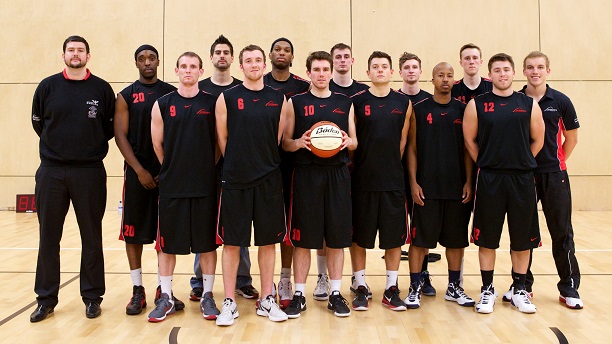

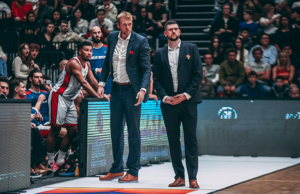
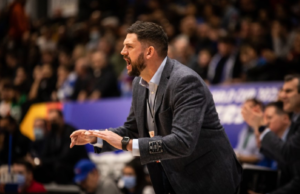
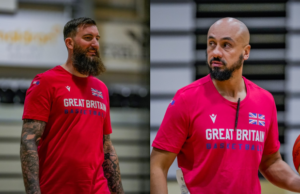

Pingback: lean project management | SteeringCloud